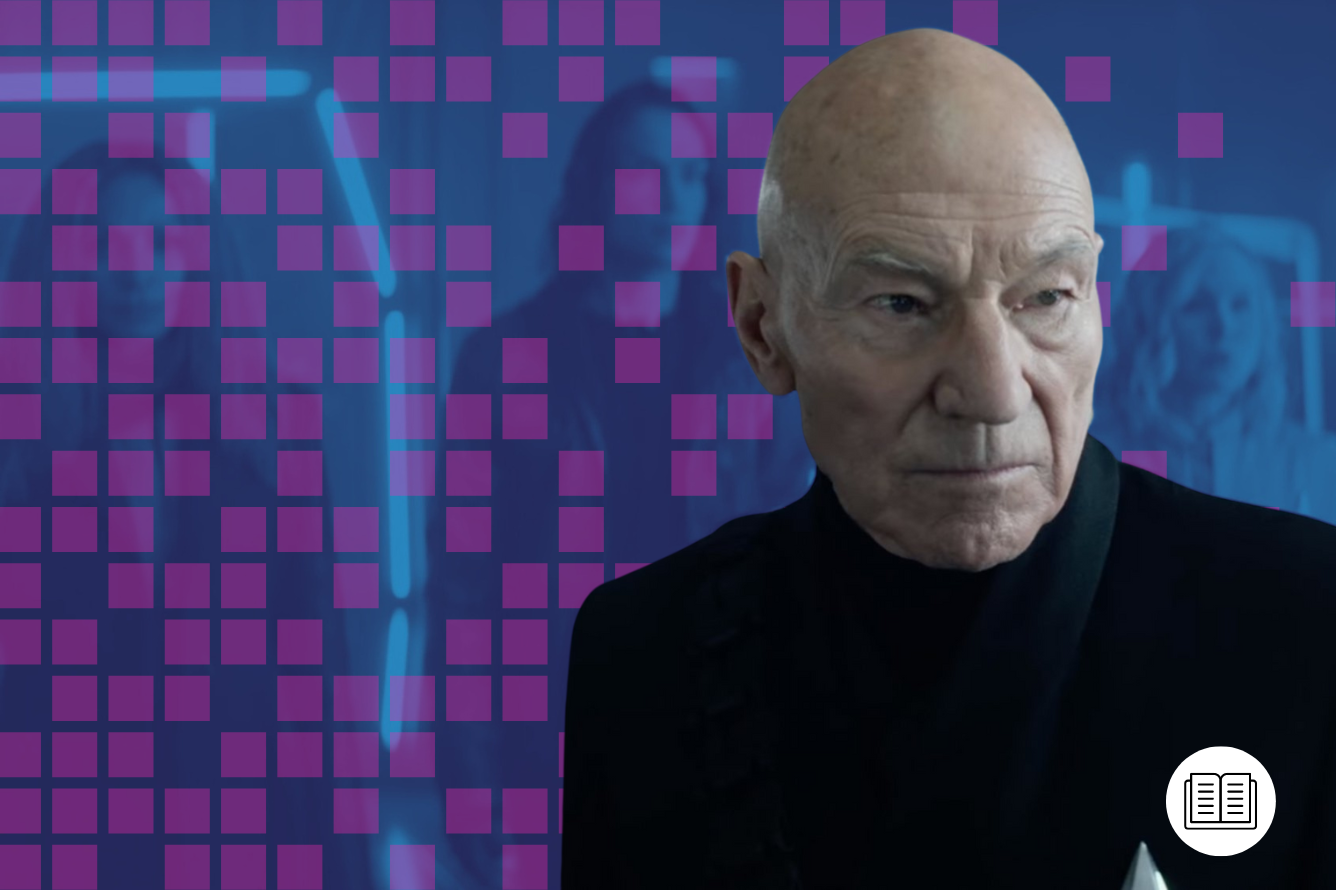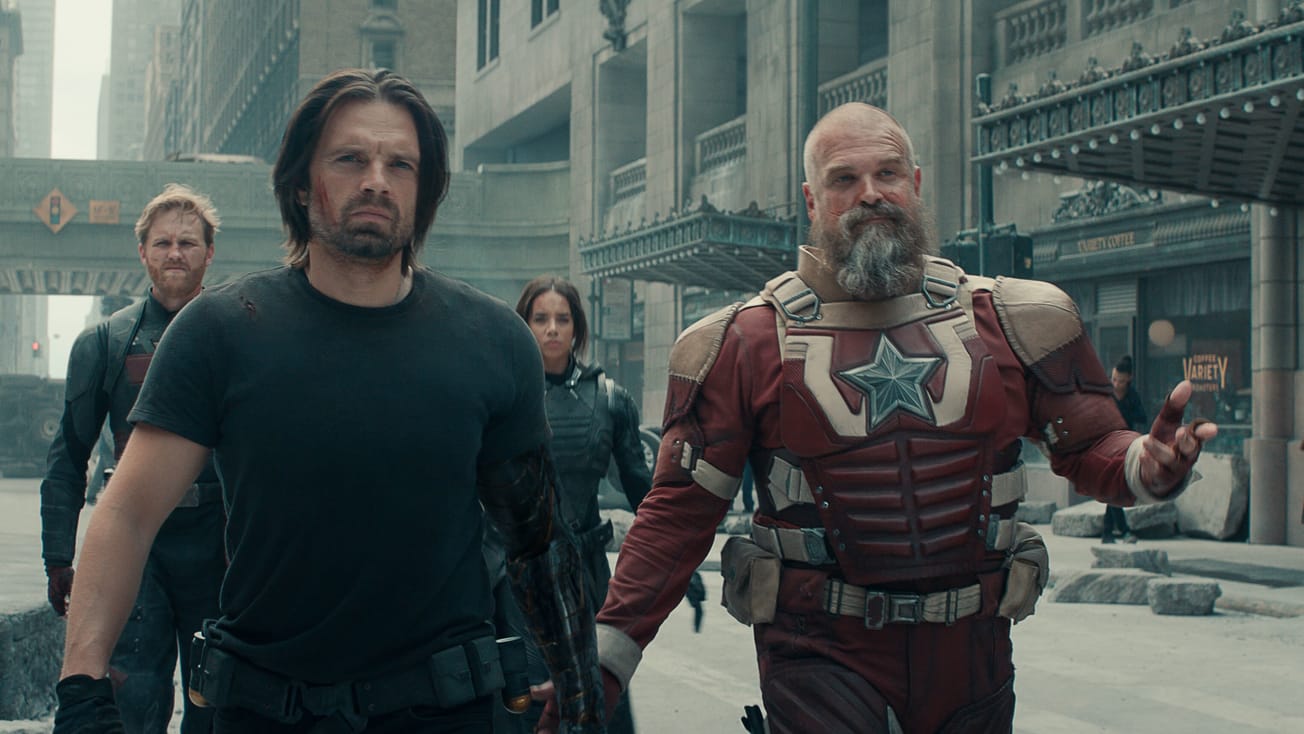It’s rare for a Star Trek series to hit a home run right out of the gate, and Star Trek: Picard is no exception. Season 1, for all its strengths—the return of Patrick Stewart and Jeri Ryan, the introduction of a strong supporting cast, and some intriguing new ideas—also succumbed to slapdash writing and the nagging feeling that this version of Jean-Luc Picard didn’t feel like the diplomat/adventurer fans had spent decades getting to know. Showrunners Akiva Goldsman and Terry Matalas (taking over for Michael Chabon, who returns as a writer) seemingly know the precarious position the end of Season 1 left them in, which is why Season 2 feels like such a hard reset for the series… and that’s before we get into alternate universes and time travel.
The central appeal of Star Trek: Picard lies not just in the superficial joys of seeing Sir Patrick in the world of Starfleet again, but that it styles itself as more of an intimate character study than the shoot-em-up ensemble adventures of its forebears. Granted, the erstwhile crew Picard has surrounded himself with gets its fair share of focus (even more so in Season 2, based on the three episodes provided to critics), but Goldman and Matalas remain committed to using this show to keep its focus on its central character. The results are a lot more ambitious and welcoming to Star Trek fans than the ramshackle contrivances of Picard Season 1, though there are still plenty of chances to drop the ball.
Gazing With the Stars
When last we left Jean-Luc, he’d effectively cheated death by being placed in a synthetic body that cured his irumodic syndrome (but conveniently didn’t make him any younger or stronger, or meaningfully expand his lifespan), unraveled a Romulan conspiracy, and convinced the Federation to lift the ban on synths that made characters like Soji (Isa Briones) straight up non-persons. Season 2 is rather unconcerned with those developments, preferring to not mention Picard’s new robot body or the disquieting shadow of Starfleet bigotry that cast a pall over its vision of the future. Instead, it smartly takes the parts of the show that worked (namely, the characters) and transfers them to more familiar, easily digestible territory. At least, at first.
The season premiere, ‘The Star Gazer’ (S2, Ep1), introduces us to a status quo I frankly wouldn’t mind spending an entire season in. Jean-Luc has returned to a quiet life of simple work in La Barre, France at Chateau Picard, with his incredible pupper Number One. He’s happy, or he seems to be: nonetheless, his aide Laris (Orla Brady, returning from Season 1) detects in him a longing neither vineyard nor starship can fulfill: the companionship of love. “Why have you chosen to be alone?” she asks him. Is it the duty of command? Is it the need to keep himself at a distance from others? At the age of 95 he may well be wondering whether experiencing such an incredible life was worth spending it alone.

The ragtag crew of La Sirena have all shuffled around to new phases in their lives: both Rios (Santiago Cabrera) and Raffi (Michelle Hurd) are back in Starfleet, captaining refit versions of fan-favorite ships Stargazer and Excelsior, respectively. Elnor (Evan Evagora) is a recent Starfleet Academy graduate, set to start his first tour under Raffi’s command. Dr. Jurati (Alison Pill), meanwhile, conveniently exonerated of the whole “premeditated murder” thing last season on account of “alien-induced temporary insanity” (yeah, okay, sure), is palling around with the newly-liberated Soji, who’s become an ambassador for her synth homeworld of Coppelius. Seven, meanwhile, is back to a life of gunplay and adventuring with the Fenris Rangers, flying solo in La Sirena while busting up bad guys and delivering medical supplies.
It’s a great reintroduction to these characters, putting them in nicer, or at least more fulfilling, scenarios than the miserablism of Season 1. Unlike previous Trek shows (and despite what the final shot of last season implied), the cast was never a cohesive “crew” flying under a specific flag, so seeing them pursue their own versions of happiness while still keeping in touch from time to time is a great way to portray the show’s extended family of characters. Sure, the romances that studded the late half of last season didn’t work out, turning Rios/Agnes and Raffi/Seven into estranged exes after their relationships went south. But since those love stories were pretty unmotivated in the first place, Goldsman and Matalas at least use those histories to lend some much-needed spice to their dynamics in Season 2.
That said, what good is a status quo without an inciting incident to break it? It’s not long before Stargazer detects a strange rip in the fabric of space-time, in which a mysterious signal calls for Picard’s help. Arriving at his old ship (alongside Seven, Agnes, and the rest), he soon learns that the signal comes from a Borg vessel, one that sends a call to (gasp!) negotiate for help, or even admission into the Federation.
What follows is the kind of classic moral dilemma that modern Trek seems to have little time for among the whirlwind action and weepy character back-and-forths: Picard is uncertain about the Queen’s intentions, while Seven slams her fist on the table and stresses that the Borg should be destroyed at all costs. Do they trust an implacable enemy, even when it’s asking for their help? It’s the stuff that ‘90s Trek could mine an entire hour out of.

But this is Paramount+-era Trek, so that lasts about five minutes before the Queen beams aboard and sends out H.R. Giger tentacles into the ship’s consoles, quickly taking command of Stargazer’s systems. Acting quickly, the crew set the ship to self-destruct, the show cutting to white just as the warp core detonates…
… and suddenly thrusting Picard back to his chateau in France. Only this time, everything looks different: His vineyard employs alien slaves and synth helpers, Laris is nowhere to be found, and his veranda suddenly hosts the disembodied skulls of alien enemies he has vanquished over decades of tyranny. That’s right, we’re in Mirror Universe-level territory, folks, and who could be responsible other than Picard’s puckish fremesis Q (John De Lancie) — aging himself up to match Picard’s wrinkles — as he purrs to him that “the trial never ended” and that he’s now at “the end of the road not traveled.”
Everything Old Is New Again
“The true final frontier is time,” Picard says early in ‘The Star Gazer’ to a class of Starfleet Academy graduates. And really, time is the true focus of Picard Season 2, not just in its dimension- and era-hopping twists and turns (many of whom I’m loathe to reveal beyond the show’s premiere) but in its central character as well. More so than Season 1, this Jean-Luc is a man looking back on his life and taking stock—whether he made the right decisions, held the right priorities. It’s an admirable goal for the show, especially one that applies the serialized, character-driven priorities of 21st-century television to characters who came up in the episodic heights of the ‘80s and ‘90s.
But for all of Picard’s promise to lend its central character greater dramatic weight, the answers to its many questions about Jean-Luc feel a bit too pat and reductive. It’s implied, whether through flashbacks or heart-to-hearts with Guinan (Whoopi Goldberg)—who’s still bartending at Ten-Forward (now a terrestrial bar on Earth) with her big, flat-top hat—that Picard is afraid of commitment, accentuated somewhat by witnessing her mother struggle with an abusive relationship with his father. “Look up,” she tells young Jean-Luc in the Chateau Picard veranda, implying that a better, brighter future lies there, and not in the violent domestic life of his childhood.

It’s the kind of reductive, performatively tragic revelation that leaves a bitter taste in the mouth, especially knowing the kind of person Picard has been his whole life prior to this season of Trek. Picard’s coldness has always seemed an offshoot of his pure, uncut commitment to his ship, his crew, and the intellectual pleasures of space travel and diplomacy. He was aloof when it came to interpersonal matters simply because he rarely had time for them: he took greater joy in a good book, or an especially exciting scientific discovery, than the niceties of socialization. That’s why moments like his goodbye to Wesley in ‘Final Mission’ (Star Trek: The Next Generation – S4, Ep9), or joining the bridge crew’s poker game at the end of ‘All Good Things…’ (Star Trek: The Next Generation – S7, Ep25-26) had such impact: he finally felt comfortable regarding these people not just as colleagues, but friends or surrogate sons.
Picard’s assertion that these character traits come from unspoken, previously-undisclosed personal trauma rings incredibly false, doubly so when set in the utopian future of Star Trek. Humans are complex creatures, and Picard’s had decades of time on the big and small screen to showcase that complexity in turn. To flatten those things we know and love about Jean-Luc to reductive pablum about childhood angst and mommy issues is more than a little discomfiting. (That goes double for the implication that all it’ll take to “fix” him is the right woman, which the show implies Laris may well be.)
The Voyage Home, The Long Way Round
Thankfully, Picard doesn’t wish to dwell too hard on these specific explanations for Jean-Luc’s personal issues; there’s adventure to be had. And the show maintains its high-budget aspirations while fixing some very-justified complaints about the previous season. For one thing, Starfleet feels and looks like Starfleet: the fleet isn’t just one new starship lazily copy-pasted over a starfield, but we get to see the return of fan-favorite ship designs like the Excelsior, Nebula, and even Sovereign-class ships. (The way I gasped when I got to see an Akira-class ship on my television screen again.) The production design of new ships like the Stargazer refit, as well as Starfleet Academy—dwarfed by a Golden Gate Bridge studded with solar panels—also offers plenty of eye candy for the design-happy Trek fan.
In both cast and concept, Season 2 purports to be about looking back on the past, not just Jean-Luc’s but the franchise’s itself. The return of Guinan and Q feel more organic (and less off-putting) than Brent Spiner’s puffy visage in Season 1, especially as Q seems to be experiencing whatever happens when an ageless god-being finally goes senile. His latest test for Jean-Luc, a dystopian alternate universe in which the Federation is a totalitarian regime more focused on genocide than resolving climate change, is a hoot like most mirror-universe episodes tend to be (right down to the Confederation’s oversized, ee-vil combadges). And to make things right, Picard may well have to track down this universe’s versions of the crew—who all wake up remembering how things are supposed to be—and travel back in time to the moment things went wrong, with the help of a captured Borg Queen (24’s Annie Wersching, playing the role with even more of a seductive playfulness than Alice Krige). Their destination: Los Angeles, 2024.

Over its first three episodes, Star Trek Picard Season 2 whiplashes its way from Peak Star Trek: The Next Generation mystery to Mirror Universe episode to Star Trek IV: The Voyage Home (1986) time-travel caper, which is fun from moment to moment but can leave you scrambling for solid narrative ground. It seems as though the crew will stick around 2024 for a good long while, not just because it’s cheaper to film in modern-day LA but because COVID restrictions made it downright necessary. So far, it’s a lark, but it’s all been done before (save for the oh-so-timely appearance of ICE, who may prove an obstacle for Rios, a Latino with no Earth ID).
It’s admirable what Picard manages to salvage from its disastrous first season in its first stretch of Season 2: Stewart makes a meal of the material as always, the supporting cast has grown in chemistry and confidence, and the show itself looks as good as ever. It also clearly wants to have more fun, with silly romps back to the present day to cut through the broader, more dramatic questions it asks about Picard itself. But striking that worthwhile balance between whiz-bang adventure and poignant character drama has never been this show’s strong suit, and we’ve got a lot of season left before the final threads are woven in this particular tapestry. For the sake of the show, its game cast, and the writers’ bevy of interesting ideas, I hope they stick the landing.
This article was first published on March 3rd, 2022, on the original Companion website.
The cost of your membership has allowed us to mentor new writers and allowed us to reflect the diversity of voices within fandom. None of this is possible without you. Thank you. 🙂










